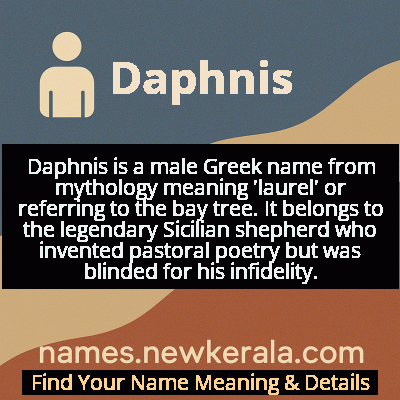Daphnis Name Meaning & Details
Origin, Popularity, Numerology Analysis & Name Meaning of Daphnis
Discover the origin, meaning, and cultural significance of the name DAPHNIS. Delve into its historical roots and explore the lasting impact it has had on communities and traditions.
Name
Daphnis
Gender
Male
Origin
Greek
Lucky Number
8
Meaning of the Name - Daphnis
Daphnis is a male Greek name from mythology meaning 'laurel' or referring to the bay tree. It belongs to the legendary Sicilian shepherd who invented pastoral poetry but was blinded for his infidelity.
Daphnis - Complete Numerology Analysis
Your Numerology Number
Based on Pythagorean Numerology System
Ruling Planet
Saturn
Positive Nature
Ambitious, efficient, realistic, and authoritative.
Negative Traits
Materialistic, stressed, confrontational, and can be overly ambitious.
Lucky Colours
Dark blue, black.
Lucky Days
Saturday.
Lucky Stones
Blue sapphire, amethyst.
Harmony Numbers
2, 4, 6.
Best Suited Professions
Business leaders, managers, financial services, law enforcement.
What People Like About You
Leadership, determination, organizational skills.
Famous People Named Daphnis
Daphnis of Miletus
Ancient Greek Poet
Credited with inventing bucolic poetry and pastoral themes
Daphnis the Shepherd
Mythological Figure
Central figure in pastoral mythology and tragic romance
Daphnis of Rhodes
Ancient Sculptor
Created notable Hellenistic period sculptures
Name Variations & International Equivalents
Click on blue names to explore their detailed meanings. Gray names with will be available soon.
Cultural & Historical Significance
The enduring cultural impact of Daphnis is most evident in Longus' ancient novel 'Daphnis and Chloe', which transformed the mythological figure into the protagonist of one of literature's most influential love stories. This work preserved and amplified the pastoral tradition through the Roman era and into modern times, inspiring countless adaptations in art, music, and literature. The character came to symbolize not just pastoral ideals but also the innocence of first love and the transformative power of nature. His legacy continues in modern astronomy, where a moon of Saturn bears his name, demonstrating how ancient mythological figures maintain relevance across millennia of cultural evolution.
Extended Personality Analysis
The name Daphnis evokes a personality characterized by artistic sensitivity, romantic idealism, and a deep connection to natural beauty. Individuals with this name are often perceived as creative visionaries who approach life with poetic sensibility, seeing the world through an aesthetic lens that transforms ordinary experiences into artistic inspiration. They tend to be charismatic and emotionally expressive, capable of profound connections with others but sometimes struggling with practical realities. The mythological association suggests someone who values freedom and self-expression above conventional expectations, often pursuing unconventional paths in life.
However, the tragic elements of the Daphnis myth also suggest potential personality challenges, particularly around commitment and fidelity. There may be a tendency toward inconsistency in relationships or a pattern of idealizing partners only to become disillusioned. The blinding in the original story symbolizes how personal weaknesses can lead to profound consequences, suggesting that individuals with this name might struggle with seeing situations clearly or learning from past mistakes. Despite these potential challenges, the name ultimately suggests someone with remarkable creative potential, emotional depth, and the ability to find beauty in unexpected places—a complex personality capable of both great artistic achievement and profound personal growth through adversity.
Modern Usage & Popularity
In contemporary naming practices, Daphnis remains an exceptionally rare choice, primarily selected by parents with strong classical education or particular interest in Greek mythology and literature. The name has never appeared in popular baby name rankings in English-speaking countries and maintains its status as a distinctive, learned choice rather than a fashionable one. Its usage is mostly confined to Greece and Greek diaspora communities, where it preserves its cultural heritage, though even there it is uncommon compared to other classical names. The name experienced a minor revival during the 19th century classical renaissance and again in the early 20th century when mythological names gained some popularity among intellectuals, but it has since returned to relative obscurity. Modern parents who choose this name typically appreciate its literary connections, particularly the enduring romance of 'Daphnis and Chloe', and see it as a sophisticated alternative to more mainstream mythological names. Its rarity makes it an appealing choice for those seeking unique names with deep cultural and historical resonance.
Symbolic & Spiritual Meanings
Daphnis carries rich symbolic meanings that extend beyond its literal translation as 'laurel'. Primarily, it symbolizes the pastoral ideal—the harmonious integration of human creativity with natural beauty, representing the poet who draws inspiration directly from the landscape. The name embodies the concept of artistic genius emerging from simplicity, where rural life becomes the source of profound artistic expression. Symbolically, it also represents the tension between romantic freedom and emotional commitment, as the mythological narrative centers on Daphnis's inability to maintain fidelity despite his deep capacity for love. The laurel connection adds layers of symbolism related to victory, achievement, and poetic inspiration, recalling how laurel wreaths crowned both athletic champions and celebrated poets in ancient Greece. The blinding in the myth serves as a powerful symbol of lost perception and the consequences of moral failings, making the name a complex representation of both human creative potential and vulnerability. Ultimately, Daphnis symbolizes the romantic artist—visionary yet flawed, capable of transforming ordinary experience into extraordinary beauty while struggling with very human weaknesses.

